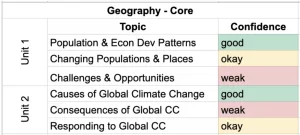Congratulations, you’ve made it to mock season! Mocks are supposed to be a learning experience. They’re here to give you a feel of what an exam schedule is like so that the real ones are less intimidating. If you’re feeling a bit lost with revising for mocks that’s okay! Here we’ll take you through our top tips for how to study for mocks.
Tip 1: Plan your revision!
You don’t need to have every day between now and your mocks planned out. However, it is very helpful to have a plan for the topics that you’re going to cover and the order you’re going to do them in.
To get started with making a plan, check which topics are going to be covered on the mocks. Your teachers will have this information. Next, go through the syllabus for each subject. Make notes of which topics you are least confident about. You’ll want to prioritise these topics by looking at them first, or spending more time on them.
Setting a schedule for which topics you want to cover on each day will help ensure you get through all of them in time. This doesn’t need to be complicated. You can simply add them as events in a digital calendar like Google Calendar. You can also jot them down in a regular monthly calendar. If that still feels too complicated, you can get a blank piece of paper and use that!
Keep your schedule in a visible place. If you have a physical one, putting it above your desk would work well. If it’s digital, try setting alerts for each day’s topics. The key thing is that you don’t want to forget what you set out to do!
Tip 2: Be methodical
Keeping track of what you’ve revised and which past papers you’ve done is key to being efficient in your revision. You don’t want to be doing the same work twice! There are a bunch of ways to keep track of this. You could write out a list and cross them off.
You could also list the topics in an Excel or Google spreadsheet. This works well if you want to keep track of how confident you are with the topic. See below for an example of this.

This method is also great for keeping track of past papers. Remember that there are two exam periods per year (May and November). There are also multiple versions of each paper made in each exam period as the IBO has to account for the different time zones. You can make a similar tracker by creating a table with the exam session as columns (ex. May 2019) and the papers/subjects as rows.
Tip 3: Prioritise active recall
When studying, you want to be as efficient as possible. It means that you perform better on exams and that you spend less time revising – a win-win in my eyes. Using revision methods that capitalise on active recall is a great way to increase your efficiency. For more information on why active recall is so important, check out this article.
Active recall is a key component of answering past paper questions and explaining concepts to others. If you’re using flashcards, you can incorporate active recall by using Anki or Quizlet so that you can type out your answers. If you prefer physical flashcards, try saying your answers out loud. The key is to make sure that regardless of the study method you’re using, you are making your brain bring up the information you are trying to learn.
Tip 4: Be prepared to learn from mistakes!
The primary purpose of mock exams is to give you a taste of what the real exams are going to be like. They serve as a ‘trial run’. It’s crucial to remember that this means they are a learning experience. It’s a chance to feel what it’s like to sit in the exam hall, to do a morning and afternoon exam, and to see what topics you will need to work on.
You are going to make mistakes in your mocks. Whether you can’t remember what a topic was, fill out the cover sheet incorrectly, or don’t get a big enough lunch, it’s okay! The important thing is to be able to reflect on and learn from your mistakes. There is plenty of time to revise before the real exams and you can make a big difference to your grades!
If you’re struggling to understand a certain topic or subject, check out our YouTube channel for loads of explanations and tips from our top tutors. If you feel like more individualised help is needed, check out our private tuition services here.



